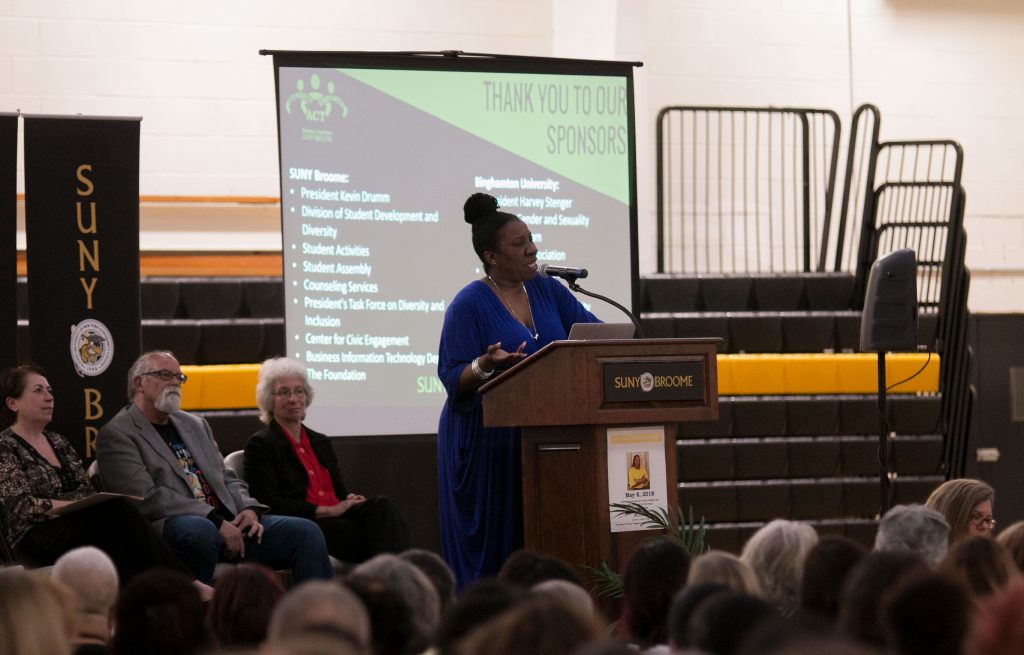
Over 400 people joined the Women’s Institute of Broome Community College (BCC) in the Baldwin Gymnasium on Tuesday evening to hear #MeToo movement founder Tarana Burke speak about the fight against sexual violence and learn about the story behind the movement.
Organized by Margherita Rossi, associate professor of psychology and human services at BCC and founder of the Women’s Institute, the event aimed to empower those who wish to end sexual violence. Students and faculty from both Binghamton University and BCC attended the event to hear Burke’s presentation and participate in a Q&A.
Burke, an activist from the Bronx and part of Time Magazine’s Person of the Year 2017: The Silence Breakers, began using the phrase “Me too” in 2006 to raise awareness of sexual abuse and assault in society. In October 2017, the phrase became a part of a broader movement following a hashtag developed during the Harvey Weinstein sexual abuse allegations.
Prior to the #MeToo movement, Burke worked with Just Be Inc., a youth organization focused on the health, well-being and wholeness of young women of color. While working there, Burke said girls would often discuss experiences of sexual assault or harassment.
“It became really clear to us that these girls needed something different,” Burke said. “They were coming to us with issues that we recognized from our childhood, but nobody had had answers for us. So, we came about helping to find a way to give these girls their sense of self-worth.”
Burke started the #MeToo movement on MySpace, and said she chose to take every resource her organization had, and their collective experience, to figure out what survivors of sexual violence needed. Because of this, Burke said she sees #MeToo as a survivors’ movement rather than a women’s movement, describing it as a global community of survivors committed to healing and ending sexual violence.
“We had a framework for how we did this,” Burke said. “#MeToo? They’re not just two words. It’s the idea of empowerment and identity that propels this movement, and our work, forward. Making sure that survivors know they’re not alone and that there’s power in surviving. I didn’t know if anyone would hear me, or believe me, but I knew it was important for me to insert myself into this conversation and say ‘I can help.’”
Following the presentation, members of the audience were given the opportunity to come forward and ask Burke questions.
The Q&A portion of the evening consisted of discussions about survivor language, improving education regarding boundaries and consent in public schools and acknowledging intersectionality in sexual violence.
Throughout the event, Burke spoke about the concept of admitting “Me too.”
“Nobody is required to say ‘Me too,’” Burke said. “You don’t have to say it [publically] to be considered a part of this [movement]. You don’t owe anybody your story or your hashtag.”
Alexis Robinson, a sophomore majoring in human development at BU, said she originally did not know much about the #MeToo movement, but after coming to the presentation, she was moved by the idea that each survivor is in control of telling their own story.
“A lot of the time, women go through sexual assault and when you’re silent, it has a negative connotation to it,” Robinson said. “They might feel like they’ve defeated themselves by not speaking up. I’m happy that she said it’s OK to choose not to speak. That it’s up to you. Being a survivor as well, it’s really nice to see that there’s an organization that represents us so well.”
Sean O’Brien, a sophomore majoring in political science at BU, said he had taken a course about social movements in the 20th century and wanted to expand by seeing what this modern social movement truly represented.
“I’d seen many variations of #MeToo in the media, and I wanted to come see the movement’s founder speak,” O’Brien said. “[The presentation] was outstanding, and it’s clear that Burke really is a woman who cares deeply about [the survivors]. I was really inspired by her message of ‘empowerment for survivors,’ and I was left with a much better appreciation for the movement.”
After six months of traveling and speaking on behalf of the #MeToo movement, Burke announced at the event that the movement will be officially partnering with The New York Women’s Foundation and starting a #MeToo fund. Half of the funds will go toward progressing #MeToo’s work, and the rest will be granted to other people and organizations fighting sexual violence.
“We want to help,” Burke said. “We want to show that healing is possible.”


